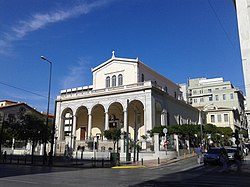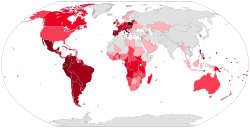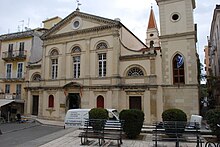Catholic Church in Greece
This article relies largely or entirely on a single source. (August 2009) |
Catholic Church in Greece | |
|---|---|
| Greek: Καθολική Εκκλησία στην Ελλάδα | |
 | |
| Type | National polity |
| Classification | Catholic |
| Orientation | Christianity |
| Scripture | Bible |
| Theology | Catholic theology |
| Governance | Catholic Bishops' Conference of Greece |
| Pope | Francis |
| Apostolic Nuncio | Savio Hon |
| Region | Greece |
| Language | Ecclesiastical Latin Greek |
| Founder | Apostles Andrew and Paul |
| Origin | 1st century |
| Separations | Greek Orthodox Church |
| Part of a series on the |
| Catholic Church by country |
|---|
 |
|
|
The Catholic Church in Greece is part of the worldwide Catholic Church, under the spiritual leadership of the Pope in Rome. Indigenous Roman Catholic Greeks number about 50,000-70,000[1] and are a religious and not an ethnic minority. Most of them are a reminiscence of Venetian and Genoese rule in southern Greece and many Greek islands (in both the Aegean and Ionian seas) from the early 13th until the late 18th century, or descendants of the thousands of Bavarians that came to Greece in the 1830s as soldiers and civil administrators, accompanying King Otto. One very old but still common term to refer to them is Φράγκοι, or "Franks", dating to the times of the Byzantine Empire, when medieval Greeks would use that term to describe all Catholics.
Since the early 1990s however, the number of Catholic permanent residents of Greece has greatly increased; today, they number 200,000 at the very least, and probably more.[1] These Catholics are immigrants from Eastern Europe (especially Poland) or from the Philippines, but also include Western European expatriates that live permanently in Athens and Thessaloniki or the Greek islands (especially Crete, Syros, Rhodes and Corfu).
Today, the majority of Catholics live in Athens, a city of about four million people; the rest of them can be found all over Greece. Most indigenous Catholics live in the islands, and especially the Cyclades, where Syros and Tinos in particular have some entirely Catholic villages and parishes. Catholics can be found also in Corfu, Naxos, Santorini, Kefalonia, Zakynthos, Rhodes, Kos, Crete, Samos, Lesbos and Chios. In the mainland, Catholic communities are smaller, and include those of Patras (a city that was home to a large Italian community until World War II), Thessaloniki, Kavala, Volos etc. In addition to the Roman Catholics (Latin Rite) who represent the vast majority of the faithful, there are about 5,000 of the Greek Rite,[1] and a few hundred Armenian Catholics.
History
This section is empty. You can help by adding to it. (June 2020) |
Popes from Greece

Bishops' Conference
The Bishops' Conference of Greece (Hiera Synodos Katholikis Hierarkhias Hellados) has six members:
- The Archbishop of Corfu and Apostolic Administrator of Thessaloniki
- The Archbishop of Naxos and Tinos and Apostolic Administrator of Chios
- The Archbishop of Athens and Apostolic Administrator of Rhodes
- The Bishop of Syros and Santorini and Apostolic Administrator of Crete
- The Exarch of the Greek Catholics of Byzantine Rite (based in Athens)
- The Ordinary of the Armenian Catholics (based in Athens)
Papal representatives to Greece

Organization
Catholic
- Archdiocese of Athens
- Archdiocese of Rhodos
- Archdiocese of Corfù, Zante and Cefalonia
- Archdiocese of Naxos, Andros, Tinos and Mykonos
- Apostolic Vicariate of Thessaloniki
Dioceses
- Catholic Archdiocese of Corfu
- Catholic Archdiocese of Rhodes
- Catholic Archdiocese of Naxos - Tinos
- Greek Catholic Exarchate
Parishes
- Catholic parish of Heraklion
- Catholic parish of Kavala
- Catholic parish of Patras
- Catholic parish of Thessaloniki
- German-speaking Catholic community in Greece
- Polish Catholic community in Greece
Greek (Byzantine) Catholic
Others
Notable Greek Roman Catholics
- Demetrios Kydones, theologian
- Ioannis Kyparissiotes, theologian
- Thomas Palaiologos, Despot of Morea
- Andreas Palaiologos, Despot of Morea
- Basilius Bessarion, scholar, theologian and cardinal
- Ioannis Argyropoulos, scholar
- Ioannis Kottounios, scholar
- Marcus Musurus, scholar
- Francisco Leontaritis, composer
- Vincenzos Cornaros, poet, playwright
- Ioannis Andreas Kargas, bishop of Syros
- Dominikos Theotokopoulos ("El Greco"), painter
- Constantine Gerachis (Phaulkon), adventurer
- Ioannis Marangos, archbishop
- Markos Vamvakaris, musician
- Antonis Delatolas, publisher of To Pontiki
- Maria Korinthiou, actress
Gallery
See also
References
- ^ a b c "Religious Freedom in Greece (September2002)" (RTF). Greek Helsinki Monitor Minority Rights Group - Greece. Retrieved 2007-09-15.
- ^ Deno John Geanakoplos, Byzantium: Church, Society, and Civilization Seen Through Contemporary Eyes (University of Chicago Press, 1984), p. 203
- ^ A.P. Vlasto, The Entry of the Slavs into Christendom (Cambridge University Press, 1970, p. 308















